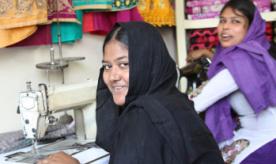Gender empowerment and productivity in the garment sector
- Within Bangladesh’s garment sector, women make up 80% of workers but less than 10% of managers.
- Researchers piloted a study that provided training to employees and evaluated their rates of promotion and performance as managers.
- They found female trainees are as or more effective managers than the male trainees, but promotion rates for the female trainees are significantly lower (55%) than for male trainees (85%).
- This research has led to the funding of a project to support the promotion of women, and a training programme being taken up by garment companies.
Garment production accounts for 80% of Bangladesh’s exports and 13% of its GDP. This study, a randomised controlled trial, was a pilot for a larger research project examining women’s inclusion in management positions in Bangladesh's apparel sector and the first of its kind in the country.
In addition to the results outlined above, there was some indication that female managers reduce worker absenteeism and increase efficiency slightly, while male managers have relatively lower rates of quality defects.
In 2016, this study led to researchers’ engagement with key private sector firms and international organisations, including with the International Finance Corporation (IFC) and the Better Work programme. This engagement led to the funding of a new project, a ‘Female Promotion Toolkit’ to assist garment factories to promote and retain female talent. If successful, the programme will be scaled-up by Better Work.
The IFC and Better Work Bangladesh are also rolling out a tailored training programme which draws from the training intervention used in the study. Similarly, there are two firms, including EcoTex, one of Bangladesh's larger garment firms with 60 production lines, that have voluntarily incorporated the training programme as part of their standard management practice.







